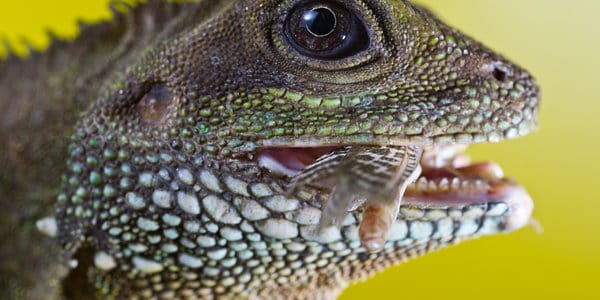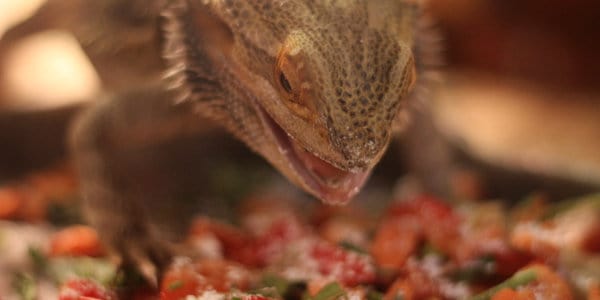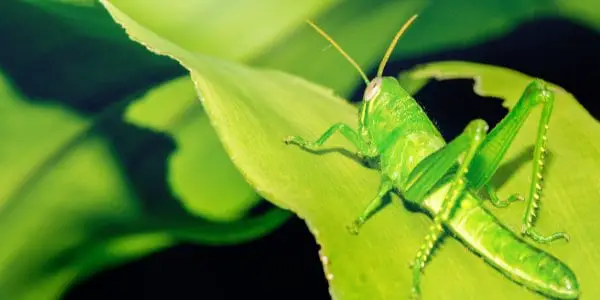Providing your pet beardie with suitable and healthy diet is key to ensuring that it stays happy and healthy. That’s why beardie owners or perspective owners often have questions regarding what beardies diet, including whether bearded dragons can eat grasshoppers. In this guide, we’ll talk about beardies diet with regard to if grasshoppers are a suitable food source for them.
So, Can bearded dragons eat grasshoppers? Is It Safe?
Yes, bearded dragons can eat grasshoppers. Grasshoppers are a safe food or snack for bearded dragons as long as they have been specially bought from a reputable pet retailers. This applies for any insects or food you look to give your pet. It’s important to ensure the insects are raised specifically for reptiles’ consumptions.
Remember that bearded dragons should not be fed wild-caught insects as these may have come into contact with harmful chemicals including herbicides and pesticides that may have far-reaching consequences to your pet beardie.
In the wild, bearded dragons eat different varieties of fruits, plants, and insects, including grasshoppers once in a while. Therefore, beardies’ owners should try to replicate this life as much as possible for their pet.
Bearded dragons can eat insects such as crickets, super worms, grasshoppers, mealworms, and crickets. These acts as excellent sources of proteins.
Remember that all insects you intend to feed your beardie dragon should come from a reputable pet store. Wild-caught insects may harm your beardie’s health as they may contain chemicals used by gardeners and farmers.
Reputable pet stores stocks different insect varieties that your bearded dragon can eat. You’ll often find live and dead insects.
Beardies can eat both dried and live grasshoppers, meaning you can give your beardie your preferred option as a treat.
In most cases, beardies will enjoy catching and consuming live insects, while others will prefer to have their grasshoppers handed them on a platter.
Let’s now talk about grasshoppers’ nutritional value and why they make healthy treats for beardies.

Nutritional Value of Grasshoppers
The main benefit of feeding grasshoppers to your pet is that it offers meal varieties to keep your beardies interested in food.
Since 20% of an adult beardie’s diet should consist of insect-based food sources, it makes sense to find alternatives to the common pets such as crickets and meal worms.
A single serving of grasshoppers packs the following nutrients:
| Nutrients | Amount in % |
| Protein | 36% |
| Fat | 41% |
| Dietary fiber | 11% |
| Calcium | 27.5% |
| Iron | 5% |
| Ash | 2.6% |
| Carbohydrates | 2.5% |
| Carotenoids | 900µg/100g |
The above table is a clear indicator that grasshoppers are healthy snacks for your bearded dragon.
Healthy Benefits Bearded Dragons Get from Grasshoppers
Insects, fruits, and plants make up a complete diet for bearded dragons. If you want to keep your dragon interested in your meals and prevent him from getting bored, you should offer them food varieties.
Offering grasshoppers as alternatives to common insects such as crickets and mealworms comes with many health benefits.
As we’ve already discussed, grasshoppers are loaded with many nutrients including vitamins, proteins, and minerals, all of which play a part in improving the health of its body.
Grasshoppers contain 36% protein, making them one of the best insect-based foods for growing bearded dragons.
Baby bearded dragons require more proteins to facilitate their body’s growth and development, muscle growth and organ function, bone development, and improvement of immune system.
Grasshoppers also provides fiber. Fiber is important for bearded dragons as it promotes regular digestion.
In addition, the high calcium content in grasshoppers also help beardies develop healthy skeletal bones and also keep metabolic bone disease at bay.
Grasshoppers are also high in vitamins A, B, and C, and are low in cholesterol. Vitamins A and C help in boosting the immune system, growth, and reproduction.
Other nutrients include vitamin B9 and B12, potassium, iron, and magnesium, that all play a role in the health of a bearded dragon.
We recommend that you include grasshoppers regularly in your bearded dragon’s diet. After regular feeding routine you should notice considerable improvement in their body size thanks to the high amount of protein in grasshoppers.
TIP: It’s important that you introduce grasshopper into your bearded dragon’s diet gently to avoid causing stomach pains and upsets.
For example, if mealworms were their primary source of nutrition, start by giving grasshoppers to them as a reward. With time, their stomach will be ready for grasshoppers as one of the primary sources of insect-based foods.
What Kinds of Grasshoppers Can Beardie Eat or Not Eat?
You can find grasshoppers in various kinds, including canned, dried, wild, etc. Let’s discuss what kinds are safe for grasshoppers.
Can Bearded Dragons Eat Dried or Canned Grasshoppers?
Bearded dragons have varying tastes, and some will find canned or dried grasshoppers tasty while others will prefer to eat those that are alive and moving as they enjoy the thrill of hunting.
If your reptile friend gobble up dead hoppers, then you’re good to go. Remember that dried grasshoppers are low in moisture, and thus you should ensure there’s water.
If you don’t like the noise and smell of a live hopper, you can let your bearded dragons eat canned grasshoppers, but remember that live insects have more nutrition compared to dried or canned prey.
Can Bearded Dragons Eat Freeze-Dried Grasshoppers?
Yes, freeze-dried grasshoppers are safe for bearded dragons. You should only feed as a supplement or occasionally for optimal nutrition. We recommend that you use them as a staple in your dragon’s diet.
Can Bearded dragons Eat Lubber Grasshoppers?
Yes, bearded dragons can eat lubber grasshoppers, but we recommend that you avoid them as they can result to serious stomach upsets and digestive problems.
Lubber grasshoppers have a similar body to locust, and contain toxins in the blood, which may end up causing health issues.
Can Bearded Dragons Eat Black Grasshoppers?
Yes, black grasshoppers are safe for beardie since they do not contain chemicals or toxins that make bearded dragon sick.
Many bearded dragon owners often feed black grasshoppers to their pet beardies as they do not pose any digestive or stomach issues.
Can I Feed My Bearded Dragon Flying Grasshoppers?
Yes, bearded dragons enjoy the thrill of hunting and thus can eat flying grasshoppers. Flying grasshoppers do not have toxins or chemicals that can harm your beardie. Most bearded dragons, including babies and old ones, can eat flying grasshoppers.
Should I Feed My Bearded Dragon Wild Grasshoppers?
When you’ve taken your beloved bearded dragon outdoor, you’ll find them getting stimulated by jumping hoppers. The lizard will rest until the ideal time comes when they catch and munch a few grasshoppers.
Although these grasshoppers are not harmful, they may have ingested pesticides and fungicides which may harm your beardie. If you let your beardie eat these hoppers, you’ll be risking their health.
If you want to feed your pet beardie live grasshoppers, get healthy ones from pet stores. You’ll find live preys including crickets and mealworms too.

FAQ
Can Baby Bearded Dragons Eat Grasshoppers?
Yes, baby dragons can consume grasshoppers as long as they’re prepared properly. However, the best insect-based food for baby bearded dragons is cricket since they have soft exoskeletons.
Mature grasshoppers tend to have hard exoskeletons that can damage your baby beardie’s teeth.
Remember to feed grasshoppers to baby bearded dragons in moderation as they are very high in protein. You should only feed baby beardies prey items of less than 5% of their body weight.
How Often Should I Feed Bearded Dragons Grasshoppers?
Bearded dragons are like human beings when it comes to getting bored of eating the same food. Therefore, it’s important to offer a variety of food to make sure they don’t get bored and upset.
While bearded will always eat insect-based food when you give it to them, the best way is to feed them occasionally as treats. Once a week is still okay and recommendable.
For baby dragons, you can feed them grasshoppers twice a week since they have higher demand for protein. Protein should make up for 70% of their diet.
How Many Grasshoppers Can Bearded Dragon Eat?
Even though bearded dragons love the taste of grasshoppers, it’s important that you don’t overfeed them. Overfeeding them with grasshoppers will make them get bored fast, which is why you should proceed with moderation.
We’ve already mentioned that you should offer grasshopper meals once a week so that they can enjoy other insects.
But how many should they eat? Well, we say it depends with several factors, such as the size of the grasshoppers and how hungry the lizard is. You may have to ask your veterinarian about the number of grasshoppers that suit your dragon.
However, you can also do your own research. Generally, bearded dragons rarely overeats. When they’ve eaten enough, they stop eating.
You can take count of the number of grasshoppers your dragon has eaten. Make sure not to leave leftover grasshoppers in their habitats.
How to Feed Grasshoppers to Your Bearded Dragon?
There are different ways you can feed bearded dragon grasshoppers, and this depends on whether the grasshoppers you’re providing are dried or alive. If you’re providing freeze dried grasshoppers, take a few from the container and place them on your beardie’s food bowl. You can also offer them from your hand, or even hide them somewhere in your beardie’s enclosure.
Hand-feeding is a good way of building a bond and trust with your beardie, and this is especially effective when you bring a new beardie home.
By doing this, your beardie will start removing you from its list of threats as it will start associating you with treats, thereby forming a positive association.
Hiding dried grasshoppers in your beardie’s enclosure helps to revive it’s hunting instincts, which also acts as a source of entertainment for your pet. They’ll likely follow the smell and ultimately, they’ll see where the treat is.
If you’re feeding your bearded dragon live grasshoppers, then you need to be patient and persistence since your dragon is not used to hunting.
It takes time for pet dragons to activate their hunting instincts. Grasshoppers provide a challenge to them as they tend to hop around. Therefore, you may need to provide the first catch by hand or in a small net.
After they’re get used, you can start to release them into the enclosure and let them chase it. It would be fascinating to watch your beardie struggle to hunt down it’s prey.
Grasshoppers act as a great source of protein for your beardie, and the best part is bearded dragons enjoy them as part of their meal.
What Other Insects Do Beardies Eat?
We’ve mentioned severally in this guide that it’s important to provide a variety of food to your beardie to prevent it from getting bored. A healthy bearded dragon diet comprises of a variety. Grasshoppers make great insect proteins but there’re are other options that are beneficial for your pet.
If you’re looking for a variety of insects to feed your beardie, you can try crickets, mealworms, horn worms, roaches, phoenix worms, wax worms, and silk worms.
Make sure to source these insects from a reputable pet store that grows them for reptiles.

Wrap Up
Grasshoppers are an excellent source of protein for bearded dragons. In addition, they provide high amounts of vitamins, calcium, ash, and fish. Feed them as treats to your beardies, either by hand, bowl, or releasing them into their enclosure.
Live grasshoppers provided more nutrients to beardies, but dried hoppers are beneficial as well. Avoid wild grasshoppers as these tend to be contaminated with pesticides and other farm chemicals.
We do hope our guide was an eye opener to new parents who are looking to expand the variety of insects they feed their beardies.